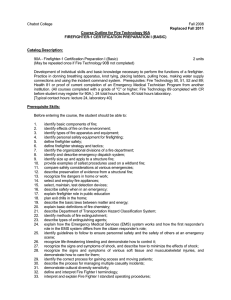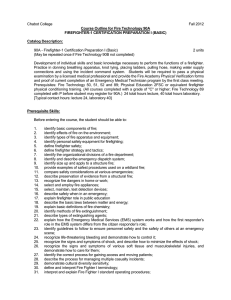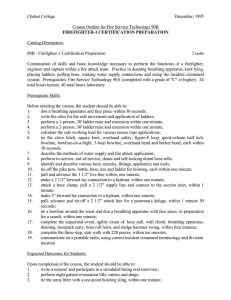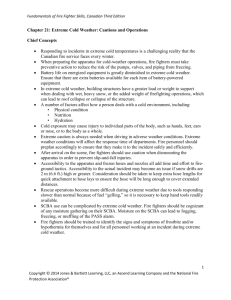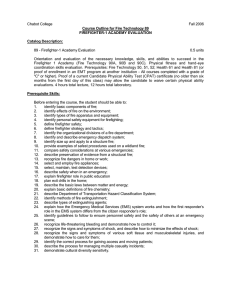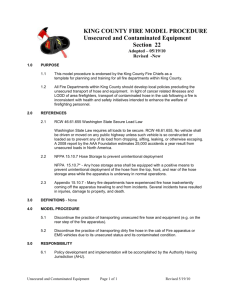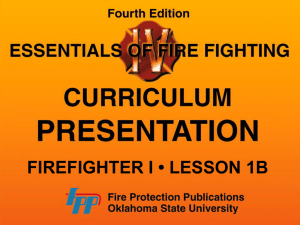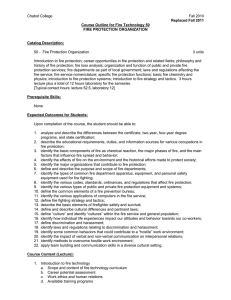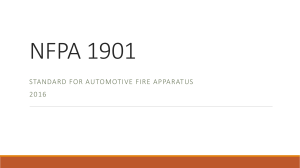Chabot College Fall 2003 Replaced Fall 2006
advertisement
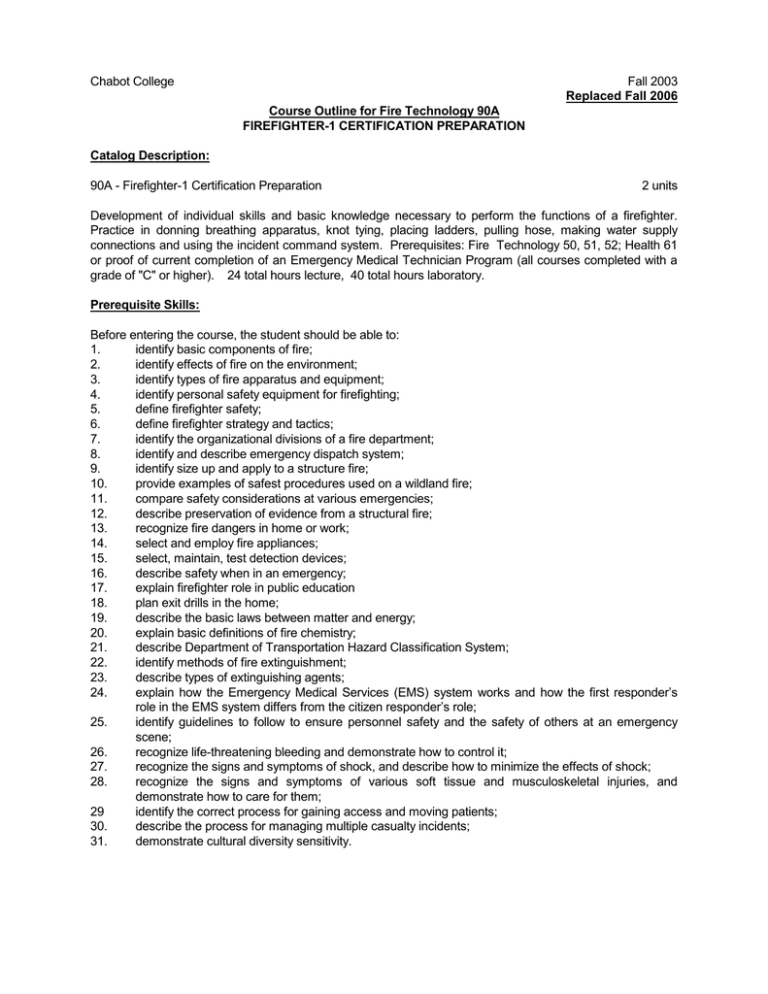
Chabot College Fall 2003 Replaced Fall 2006 Course Outline for Fire Technology 90A FIREFIGHTER-1 CERTIFICATION PREPARATION Catalog Description: 90A - Firefighter-1 Certification Preparation 2 units Development of individual skills and basic knowledge necessary to perform the functions of a firefighter. Practice in donning breathing apparatus, knot tying, placing ladders, pulling hose, making water supply connections and using the incident command system. Prerequisites: Fire Technology 50, 51, 52; Health 61 or proof of current completion of an Emergency Medical Technician Program (all courses completed with a grade of "C" or higher). 24 total hours lecture, 40 total hours laboratory. Prerequisite Skills: Before entering the course, the student should be able to: 1. identify basic components of fire; 2. identify effects of fire on the environment; 3. identify types of fire apparatus and equipment; 4. identify personal safety equipment for firefighting; 5. define firefighter safety; 6. define firefighter strategy and tactics; 7. identify the organizational divisions of a fire department; 8. identify and describe emergency dispatch system; 9. identify size up and apply to a structure fire; 10. provide examples of safest procedures used on a wildland fire; 11. compare safety considerations at various emergencies; 12. describe preservation of evidence from a structural fire; 13. recognize fire dangers in home or work; 14. select and employ fire appliances; 15. select, maintain, test detection devices; 16. describe safety when in an emergency; 17. explain firefighter role in public education 18. plan exit drills in the home; 19. describe the basic laws between matter and energy; 20. explain basic definitions of fire chemistry; 21. describe Department of Transportation Hazard Classification System; 22. identify methods of fire extinguishment; 23. describe types of extinguishing agents; 24. explain how the Emergency Medical Services (EMS) system works and how the first responder’s role in the EMS system differs from the citizen responder’s role; 25. identify guidelines to follow to ensure personnel safety and the safety of others at an emergency scene; 26. recognize life-threatening bleeding and demonstrate how to control it; 27. recognize the signs and symptoms of shock, and describe how to minimize the effects of shock; 28. recognize the signs and symptoms of various soft tissue and musculoskeletal injuries, and demonstrate how to care for them; 29 identify the correct process for gaining access and moving patients; 30. describe the process for managing multiple casualty incidents; 31. demonstrate cultural diversity sensitivity. Chabot College Course Outline for Fire Technology 90A, page 2 Fall 2003 Expected Outcomes for Students: Upon completion of the course, the student should be able to: 1. 2. 3. 4. 5. 6. 7. 8. 9. 10. 11. 12. 13. 14. 15. 16. 17. 18. 19. 20. 21. 22. don a breathing apparatus and face piece within 30 seconds; write the rules for the safe movement and application of ladders; perform a 1-person, 20' ladder raise and extension within one minute; perform a 2-person, 30' ladder raise and extension within one minute; calculate the safe working load for various rescue rope applications; tie the clove hitch, square knot, overhand safety, figure-8 loop, quick-release half hitch, bowline, bowline-on-a-bight, 3-loop bowline, overhand bend and becket bend, each within 30 seconds; describe the methods of water supply and fire attack application; perform in-service, out-of-service, donut and self-locking donut hose rolls; identify and describe various hose, nozzles, fittings, appliances and tools; tie-off the pike pole, bottle, hose, axe and ladder for hoisting, each within one minute; pull and advance the 1 1/2" live line within, one minute; make a 2 1/2" forward lay connection to a hydrant, within one minute; attach a hose clamp, pull a 2 1/2" supply line and connect to the suction inlet, within 1 minute; make 5" forward lay connection to a hydrant, within one minute; pull, advance and tie-off a 2 1/2" attack line for a poorman's deluge, within 1 minute 30 seconds; tie a bowline around the waist and don a breathing apparatus with face piece, in preparation for a search, within one minute; complete the sequential-event, agility exam of: hose pull, wall climb, breathing apparatus donning, hosepack carry, hose roll hoist, and sledge hammer swing, within four minutes; complete the three-step, stair walk with 220 passes, within ten minutes; communicate on a portable radio, using correct incident command terminology and division locations; perform the ICS 100-200 duties in practice; perform the First Responder Operational Hazardous Materials duties in practice; work with culturally diverse groups as a team. Course Content: 1. 2. 3. 4. 5. Physical agility Safety procedures and program orientation Ladder operations: a. Terminology b. Selection criteria c. Construction d. Maintenance e. Carries and raises Rope management: a. Construction b. Maintenance c. Safe working load d. Knot tying and tool hoisting Breathing apparatus: a. Safety equipment Chabot College Course Outline for Fire Technology 90A, page 3 Fall 2003 6. 7. b. Donning procedure c. Maintenance and refill Peaked roof ventilation evolution Structure search Methods of Presentation: 1. 2. 3. 4. Lecture/discussion Sample tools, video, overlays, slides Demonstrations including use of protective equipment, proper tool movement procedures Stimulations Assignments and Methods of Evaluating Student Progress: 1. Typical Assignments a. Timed operation of donning breathing apparatus b. Raise ground ladders in a safe and expedient manner c. Put in effect incident command system 2. Methods of Evaluating Student Progress: a. Homework b. Quizzes c. Midterm examinations d. Final written and tool function recognition lab examination Textbook(s) (Typical): Essentials of Firefighting, IFSTA Publications, 4th Edition, 2002 Special Student Materials: 1. 2. Firefighter-1 uniform shirt, black pants, work boots, gloves Turnout coat, pants, helmet revised: 11/14/02
